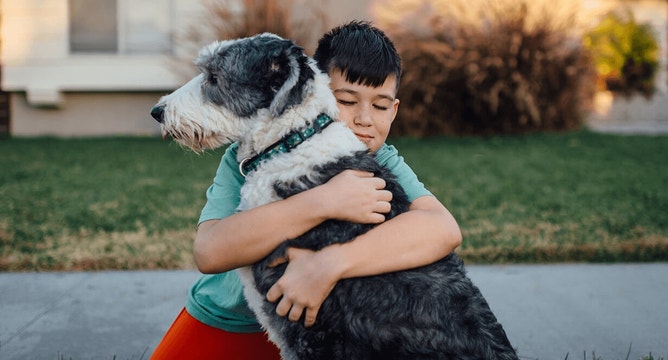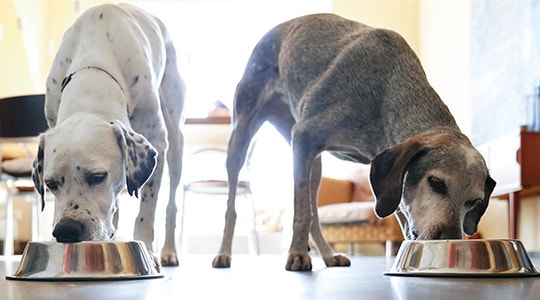
Nutrition for Large- and Giant-Breed Adult Dogs
Healthy joints and proper weight are especially important for dogs that grow to be more than 50 pounds. But not all large- and giant-breed adult dogs have the same nutritional needs. Is your dog getting proper exercise? Is she about to have puppies? Special conditions can dramatically affect your dog’s nutritional demands. Giving her a food specially formulated for her large size, life stage and activity level is the easiest way to make sure she’s getting the nutrients she needs.
Choosing a Food for Overall Health
To address the special needs of your large- or giant-breed dog, look for these features:
- Less fat to help maintain an ideal body condition for less joint stress
- Vitamin-rich fish oils for healthy skin, shiny coat and overall health
- Essential vitamins and minerals to help support the immune system and help maintain good health
- High-quality animal-based protein sources to help maintain muscle tone
- A moderately fermentable fiber source, such as beet pulp, to maintain intestinal health, enhance your dog's ability to absorb nutrients, and reduce backyard cleanup
- A carbohydrate blend to help sustain energy by maintaining normal blood sugar levels
These components are key to good nutrition. Look for them in treats, wet dog food, or dry dog food, such as IAMS™ ProActive Health™ Adult Large Breed.
Maintaining Healthy Joints and Cartilage
Joint health is a big concern for owners of large- and giant-breed dogs. A large- or giant-breed formula that contains high-quality protein can help nourish healthy joints. Vitamins and minerals help promote the production of cartilage. Also, keeping your dog at a healthy weight will help minimize joint stress.
Guarding Against Weight Gain
Dogs with lower activity levels and dogs that have been neutered or spayed are all prone to weight gain. Controlling your dog’s weight is an important step toward protecting against the health effects of excess weight, such as diabetes or joint health problems. If you use a weight-management food, look for these characteristics:
- A reduced fat level that still offers essential nutrients for skin and coat health
- L-carnitine, a key nutrient that helps burn fat and maintain muscle mass during weight loss
- Special carbohydrate blends that help maintain energy while managing weight
- Vitamin-rich fish oils for overall health
Providing Nutrition During Pregnancy
Pregnant dogs have substantial nutrition requirements. Starting in the seventh week of her pregnancy, a mother dog will need to increase her energy intake up to 50% by the time she gives birth and increase it even more when she starts nursing her puppies. Because she may lose her appetite at times, it's important that she eats a nutrient-dense food. A complete, balanced puppy formula can give her the extra nutrients she needs. But avoid puppy food created for large and giant breeds; these formulas contain specially adjusted levels of energy and minerals that may not be sufficient for a pregnant or nursing dog.
Switching to a Mature Diet
Dogs who grow to be more than 50 pounds are considered mature or senior at age 5 or 6, which is earlier than small-breed dogs. So, it’s critical to make a proactive transition to a specially formulated mature diet, such as IAMS™ ProActive Health™ Mature Adult Large Breed, to help keep your dog healthy and active as she ages.




